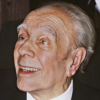Jorge Luis Borges

Jorge Luis Borges
Jorge Francisco Isidoro Luis Borges KBE; 24 August 1899 – 14 June 1986), was an Argentine short-story writer, essayist, poet and translator, and a key figure in Spanish-language literature. His best-known books, Ficcionesand El Aleph, published in the 1940s, are compilations of short stories interconnected by common themes, including dreams, labyrinths, libraries, mirrors, fictional writers, philosophy, and religion...
NationalityArgentinian
ProfessionPoet
Date of Birth24 August 1899
art writing thinking
Art is very mysterious. I wonder if you can really do any damage to art. I think that when we're writing, something comes through or should come through, in spite of our theories. So theories are not really important.
art rivers passing
Art is endless like a river flowing, passing, yet remaining...
art writing ephemeral
The art of writing is mysterious, the opinions we hold are ephemeral....
art practice library
To arrange a library is to practice in a quiet and modest way the art of criticism.
art self style
I would define the baroque as that style that deliberately exhausts (or tries to exhaust) its own possibilities, and that borders on self-caricature. The baroque is the final stage in all art, when art flaunts and squanders its resources.
art play library
Lully's machine, Mill's fear and Lasswitz's chaotic library can be the subject of jokes, but they exaggerate a propensity which is common: making metaphysics and the arts into a kind of play with combinations.
art temptation genius
Mir Bahadur Ali is, as we have seen, incapable of evading the most vulgar of art's temptations: that of being a genius.
art memories men
The task of art is to transform what is continuously happening to us, to transform all of these things into symbols, into music, into something which can last in man’s memory. That is our duty. If we don’t fulfill it, we feel unhappy.
art jobs writing
Any time something is written against me, I not only share the sentiment but feel I could do the job far better myself. Perhaps I should advise would-be enemies to send me their grievances beforehand, with full assurance that they will receive my every aid and support. I have even secretly longed to write, under a pen name, a merciless tirade against myself.
art exercise intellectual
There is no intellectual exercise which is not ultimately useless.
art memories book
The gods weave misfortunes for men, so that the generations to come will have something to sing about.” Mallarmé repeats, less beautifully, what Homer said; “tout aboutit en un livre,” everything ends up in a book. The Greeks speak of generations that will sing; Mallarmé speaks of an object, of a thing among things, a book. But the idea is the same; the idea that we are made for art, we are made for memory, we are made for poetry, or perhaps we are made for oblivion. But something remains, and that something is history or poetry, which are not essentially different.
art opportunity men
Chang Tzu tells us of a persevering man who after three laborious years mastered the art of dragon-slaying. For the rest of his days, he had not a single opportunity to test his skills.
art theology humans
God must not engage in theology. The writer must not destroy by human reasonings the faith that art requires of us.
art individual concrete
Art always opts for the individual, the concrete; art is not Platonic.